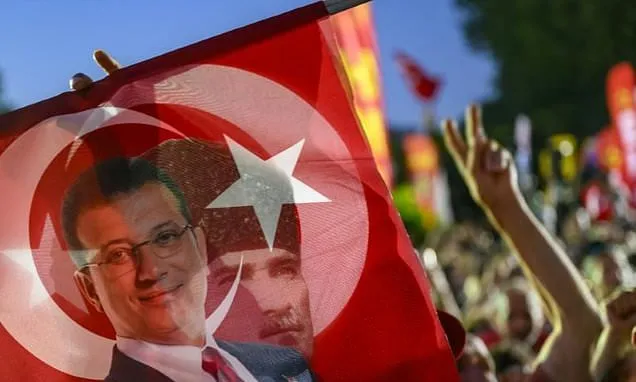A senior leader of Turkey's beleaguered main opposition party accused the government of fabricating enemies in a politically motivated crackdown to reassert control after its election defeat last year, in an interview with AFP.
President Recep Tayyip Erdogan's AKP party "politically named the new enemy on March 19 -- (and) the new enemy is the CHP," said Burhanettin Bulut, a deputy leader of the Republican People's Party (CHP).
Bulut, in charge of the party's public relations and media, said Erdogan was threatening the country's democratic foundations through his government's campaign of arrests and lawsuits.
Turkish authorities have detained a string of elected officials on charges ranging from graft to terror-related offences, including, on March 19, Istanbul's powerful mayor Ekrem Imamoglu -- Erdogan's main rival.
"This government keeps itself alive by constantly defining an enemy," Bulut told AFP in an interview at the party's headquarters in the capital Ankara.
The government "sustains its political strategy through polarisation -- manufacturing a foe and launching relentless perception campaigns in a bid to consolidate its voter base", he said.
A year after Erdogan's allies suffered heavy losses in local elections, Imamoglu's detention triggered the country's largest street protests in over a decade.
"This isn't just about the CHP," Bulut added.
"From the grocery store clerk to the apprentice, from businesspeople to artists and journalists -- people across this country are afraid."
'Dynamite' for republic
Since Imamoglu's arrest, Turkish authorities have detained 16 CHP mayors, including ones in key districts of Istanbul, and replaced elected officials in at least three municipalities with government-appointed trustees.
Among those detained is the acting mayor of Istanbul's Buyukcekmece district, a party source told AFP.
CHP leader Ozgur Ozel, re-elected at an emergency party congress a month after Imamoglu was jailed, has come under mounting legal pressure meanwhile.
He faces lawsuits on alleged offences including "insulting the president" and vote-buying at a party congress.
Media reports have suggested efforts were under way to lift Ozel's parliamentary immunity so he could face prison.
Bulut alleged the crackdown "creates a smokescreen for the real issues facing society -- poverty, injustice, the erosion of democracy and individual rights -- that are pushed out of the public agenda".
Arresting Ozel, he said, would be "like planting dynamite under the foundations of the Republic" -- but he played down concerns for its impact on the CHP, which he said was "not a leader-centred party".
He dismissed government claims of a crisis in the CHP as "political theatre".
"It's a founding party, with a deep-rooted history, led by some of the most important figures in Turkish political life - starting with Mustafa Kemal Ataturk," founder of the modern Turkish republic, he said.
"That's why interfering with the leadership of this party is not something that can be done easily."
Turkish democracy and justice
The government's crackdown started with a key arrest seven months after the March 2024 local elections.
Authorities detained the CHP mayor of Istanbul's working-class district of Esenyurt, Ahmet Ozer, accusing him of membership of the banned Kurdistan Workers' Party (PKK).
They have since removed CHP mayors in three districts in Ovacik in the east as well as in Esenyurt and Sisli and replaced them with trustees.
The government has insisted the arrests have judicial legitimacy but critics say they are aimed at neutralising dissent in big cities where the opposition won in the elections.
The government recently claimed a historic breakthrough by overseeing the disarmament of the PKK, ending its decades-long campaign of attacks.
In that context, Bulut argued: "You can't claim to support democracy and justice while appointing trustees at the same time."
"If you're serious about democracy, then local consensus must be part of the process."
Despite pressure and fear tactics, he insisted the CHP would "be the clear winner" in the next election, expected by 2028.
